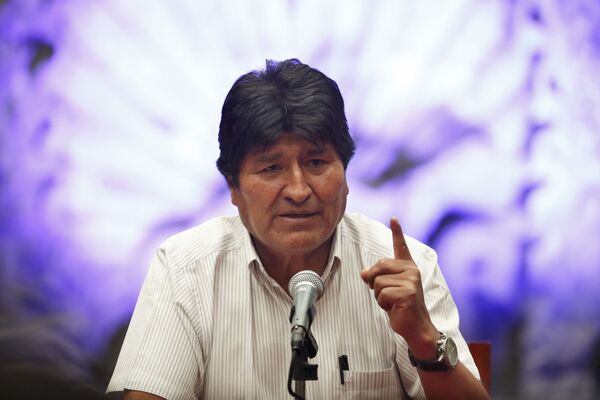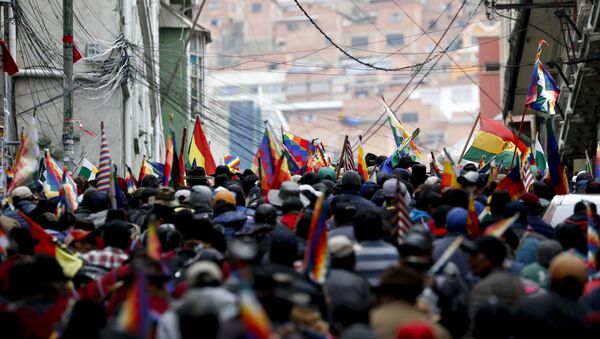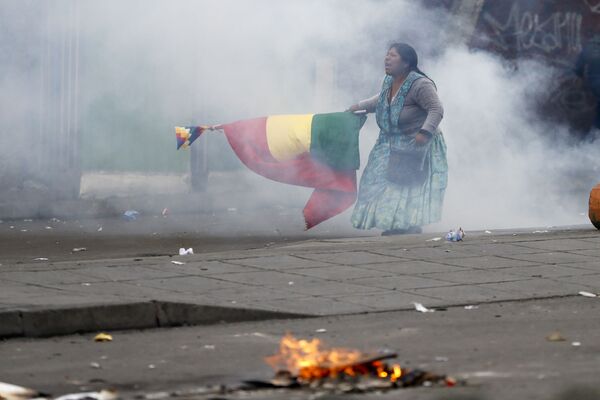On 20 November, former Bolivian President Evo Morales called upon the United Nation (UN) and the Inter-American Commission on Human Rights (IACHR) to stop the persecution of indigenous Bolivians by the "dictatorship" of Carlos Mesa, Luis Fernando Camacho and Jeanine Anez as a death toll grows amid clashes between security forces and Morales' supporters.
Following the ouster of Morales, Anez declared herself interim president of the country on 12 November, backed by the military and opposition leaders. The regime change and the de facto interim government's policies prompted nation-wide protests.
On Thursday, Henry Cabrera, a senior member of Morales' Movement for Socialism (MAS) party, told Reuters that neither Morales nor his former vice-president, Alvaro Garcia Linera, would participate in Bolivia's next elections.
Brazilian diplomat and politician Celso Luiz Nunes Amorim, who twice held the position of foreign affairs minister between 1993 and 1994 under President Itamar Franco and then between 2003 and 2010 under President Lula da Silva, explains what role the UN and IACHR may play at this stage and gives his prognosis on how the situation will develop in Bolivia.
Sputnik: Will the international community respond to Morales' call? How could the UN and IACHR force the de facto interim government to stop the violence?
Celso Amorim: The criticism that the UN and the IACHR has a moral value, since it transmits to the world an impression about the country that may affect it in various aspects, political, economic, etc. These organisations have no power to impose a change of attitude in this scenario. The only one that has this power is the UN Security Council but it would not interfere because there would be a veto from the US, which directly or indirectly is supporting this coup, it's undoubtedly a coup. These UN and IACHR procedures may have an influence on Bolivian international relations, but they have no power of enforcement.
I think this is important that there is criticism and condemnation. The UN High Commissioner for Human Rights, Michele Bachelet, expressed concern about the growing cases of violence, especially with the participation of the state itself.
The UN has another possible role of trying to mediate the situation to find a suitable solution, but I cannot say what Evo Morales will find appropriate. As he himself had agreed to call elections, this might be the best way out, but Evo Morales must be allowed to participate because he did not commit any wrongdoing.
The very irregularity that would have been committed is debatable, there is no trust in the Organisation of American States (OAS), he [Morales] is even willing to be scrutinised. The coup and the use of violence tend to radicalise the situation making it more difficult to mediate a solution. There must be a case of diplomatic pressure. The UN can play a mediating role between the various forces.

Sputnik: Earlier there were rumours that the MAS-dominated Bolivian Legislative Assembly would reject Morales' resignation. However, the Legislative Assembly said Tuesday that it suspended the vote on this matter to restore calm. New Senate head Eva Copa Murga told reporters the assembly would annul the results the Oct. 20 election and announce a new vote. What's your take on the Assembly's decision? What are the chances that MAS would participate in the next elections given Anez' recent claims that it's up to the Supreme Electoral Tribunal to decide "whether or not MAS will run again"?
Celso Amorim: This is an anomalous situation, with the indigenous supporters of the MAS being the object of violent repression; parliamentarians may have difficulties reaching the Parliament [because of conflicts on the streets]. I can't judge whether it was a mistake or not. I say again that the elections should be held with the participation of Evo Morales, unless he does not want to. This is the only possible solution. Any other solution will meet a lot of resistance from the indigenous people, who are the majority in Bolivia and who are militants, so the participation of the UN Secretary General is important. In this process the OAS has lost its credibility. We see that for a long time this organisation has been following US guidelines, specifically President Trump's, in various situations such as in the case of Venezuela.
This time it became clear why the OAS was recommending a second round before having audited the vote, it's suspicious. And the fact that it abides by the mandate of the self-proclaimed president makes the OAS much less effective, with less credibility.
There is a contradiction about the new Supreme Electoral Court, since the previous one was dissolved on the grounds that it was controlled by Evo Morales. The pre-existing court would have followed the line of new elections. Evo himself suggested reforming the Supreme Electoral Court to meet the demand of other political forces. Will Anez recreate the court herself? On what basis? She has no legitimacy – there was no provision in the Constitution about her arrival in office.
Sputnik: Judging from what Brazil and its former leadership have undergone in recent years, could you make a prognosis on how the situation will develop in Bolivia? Could the conflict spiral into a civil war and how could the international community prevent this?
Celso Amorim: I think [Alberto] Fernandez and [Andrés Manuel López] Obrador can help with mediation, with the participation of the United Nations and other countries. Brazil disqualified itself by recognising the self-proclaimed president, as has happened in other cases such as Juan Guaido's. In contrast to this situation, in 2008 Brazil was a central actor, not the only one, when I personally participated with the group of foreign ministers from Argentina, Colombia, after which the issue went to UNASUR, where Evo made concessions to some political leaders. It was a reasonable solution. I observe an inability in the region to mediate.
The issue like this should not have gone directly to the OAS, which is the subject to ideologisation, to North American hegemony. It should rather be handled by South American, Latin American, and Caribbean groups, such as CELAC [Community of Latin American and Caribbean States], which has the presence of all Latin American and Caribbean countries, without the United States.
There is no reason for the US to get involved in the issues of our region, it is not a matter of the US security. It is a matter for Latin America and the Caribbean [countries], like the crisis between Colombia and Ecuador, which went to the OAS only after it had been resolved through the “Rio Group”. Bolivia's previous crisis was resolved at UNASUR, as well as another dispute involving Colombia and Venezuela was also resolved at UNASUR. The OAS in this case only complicates the matters.
The US interest is not purely political, there is also economic interest. Lithium is a strategic mineral, there would be unproven reserves of uranium in the country. These are very delicate issues. Brazil's largest border is with Bolivia, and vice versa. Brazil should have had a role of a mediator to help find the solution. By recognising a self-proclaimed president after a coup d'état [in Bolivia], Brazil disqualified itself.
There is a risk of civil war, because there is a big difference between the inhabitants of the Altiplano and the inhabitants of the Half Moon (Media Luna). There are supply problems. The civil war may not erupt, but there may be a very prolonged conflict with very serious consequences for all sides and could even affect the gas supply in Brazil. Evo is quite pragmatic, personally attended the inauguration of Jair Bolsonaro. Brazil should have not supported the coup, let alone the self-proclaimed president.
Alan Dantas, a Brazilian journalist and editor of Dossier Sul contributed to this article.





